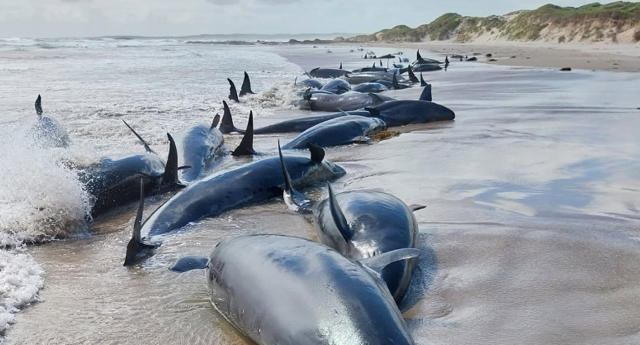Australian authorities have announced they will euthanize approximately 90 false killer whales that survived a mass stranding on a remote beach in Tasmania. The decision comes after a team of experts confirmed that the complex conditions at the site made it impossible to save the remaining whales.
The stranded pod, consisting of 157 false killer whales, was discovered near Arthur River in Tasmania’s northwest. Tragically, the majority of the whales had died shortly after the stranding, and the survivors have been under extreme stress since their beaching.
Tasmania, which has witnessed a series of mass whale strandings in recent years, including the country’s worst-ever stranding in 2020, has not seen false killer whales strand in over 50 years. False killer whales, while technically a species of large dolphins, can grow up to 6 meters (19 feet) in length and weigh up to 1.5 tonnes.
The pod had been stranded for 24 to 48 hours before the decision to euthanize was made. Local resident Jocelyn Flint, who visited the site on Wednesday, described the heartbreaking scene. “There are babies… There’s just families of them. Their eyes are open, they’re looking at me, like ‘help’. It’s just absolutely horrific,” she told the Australian Broadcasting Corporation.
The site, located about 300 km (186 miles) from Launceston, is challenging to access, making the rescue efforts even more difficult. Marine biologist Kris Carlyon, who has worked on numerous strandings over the past 16 years, explained the difficulty of reaching the site: “We’re talking a very rough, steep, single-lane road. We can get four-wheel drives in there, but not much else.”
Rescue attempts to relocate two of the whales and refloat them were unsuccessful. “The animals just can’t get past the break to get out. They keep turning around and coming back towards the beach,” said Shelley Graham from Tasmania’s Parks and Wildlife Service.
With conditions expected to remain similar for the next two days, veterinarians made the tough decision to euthanize the remaining whales. “The longer these animals are stranded, the longer they are suffering. Euthanasia is always a last resort, but all other options have been unsuccessful,” Dr. Carlyon said.
The euthanasia process, which involves shooting the animals, is set to begin Wednesday and will likely continue into Thursday. Authorities are also working on a plan to dispose of the carcasses, though the location is culturally significant to Aboriginal people, and there may be considerations to let nature take its course.
Members of the public have been asked to avoid the area due to ongoing bushfires nearby and the limited road access.
Tasmania is known for having more than 80% of Australia’s whale strandings, particularly along its west coast. In 2020, around 470 pilot whales stranded in Macquarie Harbour, with approximately 350 dying despite rescue efforts. Another 200 whales stranded in the same area in 2022.
Whales are highly social animals and often strand in groups, likely due to their close-knit communities and reliance on constant communication. The exact reasons behind beachings are still debated, but some experts suggest the animals may become disoriented after chasing fish too close to shore, while others believe one whale’s actions can lead an entire group to follow.
Disclaimer: This is an AI-generated live blog and has not been edited by Localtak staff.
Also Read: Trump Questions Aid to India Over High Tariffs 2025















 Categories
Categories









